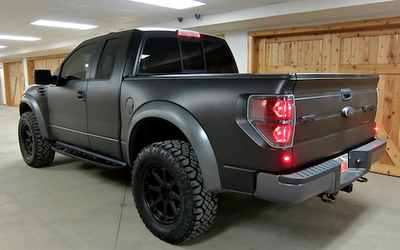Erase from your memory the F-150 Lightning, SVT's tire-smoking sports car/pickup. For 2010, SVT went the extreme opposite direction with the F-150 SVT Raptor: A mogul-jumping, off-road desert runner. Raising the number of F-150 models to nine is the Harley-Davidson F-150 edition, which features 22-inch-diameter polished, forged aluminum wheels, chrome exhaust tips and Harley-Davidson graphics and logos on just about every available space.
Existing models get several new features, too. A chrome billet grille is available on the XLT Chrome package, a chrome mesh grille insert comes on the Lariat Chrome package and black tubular running boards are available on the XL Regular Cab and SuperCab.
The first F-150 SVT Raptors will come with the 320-hp, 390 lb.-ft. torque, 5.4-liter V8 offered in other F-150s. Available later will be a 6.2-liter V8 with approximately 400 hp that'll launch the SVT Raptor into low-earth-orbit if you can find the right jump. Just make sure to nail the landing after re-entry. In addition to the Raptor's 6.2L V8 (which will come with a six-speed automatic), the 2010 F-150 is available with three engines, all V-8s: a 320-horsepower, 5.4-liter; a three-valve-per-cylinder 292-horsepower, 4.6-liter; and a two-valve-per-cylinder 248-horsepower 4.6-liter
The first two come with a six-speed automatic, while the two-valve 4.6L is mated to a four-speed automatic. A two-wheel-drive F-150 with the 4.6-liter, three-valve engine is EPA estimated at 21 miles per gallon on the government's highway driving cycle. A 2WD 5.4-liter will provide 20 mpg on the highway.
Some keys to successful desert race trucks are long suspension travel to soak up bumps and keep the drive wheels on the ground, robust shock absorbers with extra fluid reservoirs to prevent overheating, and reinforced suspension components to stand up to the constant pounding. The Raptor has over 12 inches of travel in the rear suspension and over 11 up front. While long for a stock vehicle, it's far less than half of pure race trucks, so don't challenge Robbie Gordon to a desert duel.
The Raptor is equipped with specially designed Fox Racing Shox shock absorbers, designed to maintain their performance over miles of washboard surfaces. To take the pounding of a sprint through the desert, Ford added a beefier rear axle housing and a completely new front suspension with strong upper and lower control arms and stronger tire rods, among other enhancements. The Raptor also has a seven-inch wider track - the distance between tires on the same axle - to improve stability while bouncing between the sagebrush and yucca plants.
For situations where deep sand or mud slow progress, the Raptor has a locking rear differential. In addition, selecting the off-road mode disables the electronic driver aids (electronic stability control and traction control) and switches the logarithm of the anti-lock brakes to a more off-road- appropriate setting. The Raptor is fitted with giant 315/70R17 BFGoodrich All-Terrain TA/KO tires. These 35-inch diameter tires add ground clearance to help avoid contact with rocks. Just in case that's not enough clearance, the Raptor comes standard with heavy-duty skid plates to protect the oil pan, transmission and other key bits under the vehicle.
Visually, the Raptor has a unique grille, front bumper and fenders. Inside, there's a revised console. The steering wheel features an orange stripe at the top, similar to those found on NASCAR racecars, to help the driver know how far the wheel is turned in case he loses track in the excitement. The Raptor is available only as a four-wheel-drive SuperCab with a 5.5-foot bed.
Studies have shown that many Harley riders like to tow their motorcycles to events, rather than eat June bugs all the way there and back. And the Ford F-150 is one of their most popular choices for that tow work, with Ford's Trailer Sway Control. Whether they know it or not, the 2010 Ford F-150's biggest advantage for Harley pullers is how Ford has reprogrammed the pickup's electronic stability control system computer to recognize when the trailer begins to sway then react to quell trailer motion by applying individual brakes or reducing acceleration. Also, an optional in-dash trailer brake controller prevents the bruised knees and scraped shins common with aftermarket controllers. And let's not forget... there are Harley-Davidson logos on the sides, front fenders, tailgate, ignition key, door trim panels, the windshield and a few other places.





